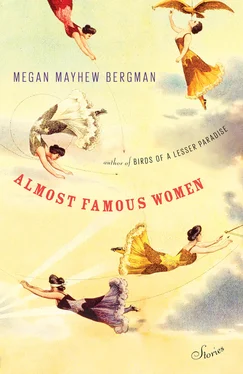She treaded water, fingers moving against the dark sea, pushing it away to keep herself afloat. There were rocks jutting out from the water, a near miss. There were strange birds nesting in the tall grass, a native woman bleeding on a straw mattress in a hut on the south shore, a stone house strangled by fig trees.

Norma Millay’s high school graduation photo.
Camden, Maine, 1912.
Photo reprinted with permission of the Camden Public Library.
NORMA MILLAY’S FILM NOIR PERIOD
ACT I
Her earliest memory is a fever dream, her mother, Cora, retreating from her bedside, a backlit head surrounded by a pale yellow aura. Sailing, sailing over the bounding main , Cora sings, still in her nurse’s uniform with the puffed sleeves and starched collar. Where many a stormy wind shall blow . Her voice fades into silence. Diminuendo, thinks Norma, who longs to bring Cora’s voice back, to wrap herself in the familiar mezzo-soprano until she falls asleep, but now she’s left clinging to a thread of consciousness.
Sometimes Cora sets the metronome on top of the old piano, adamant the girls should learn time signatures. “You don’t have the luxury of being mediocre,” she says, leaning over them with a humorless face. “Not moderato, allegro!” In the recesses of her mind Norma can hear the tick-tick-ticking increasing in speed until it flatlines into a solid wall of sound. She nods off, wakes up, nods off again on the damp pillow.
The Maine winter is cold enough to freeze the soft curls on her head after a bath, and the water that leaks onto the kitchen floor, but tonight she sweats like it’s a July afternoon on the bay. She keeps one leg on top of the pile of worn quilts. She thinks of eating pickled figs in early summer. Her eyes are hot and a briny taste fills her mouth.
Vincent and Kathleen share the bed, their downy knees and sharp elbows pushing at her back and legs, which she resents and cherishes all at once. The smell of their bodies, not so frequently bathed in winter, is familiar, something like lavender soap, sweat, and pine sap, which falls into their hair when they collect kindling for the stove. She loves knowing her sisters are by her side even as Cora leaves in the dark of morning with an ugly brown coat buttoned over her uniform. “You’re a tribe,” she told them years ago, on their first day back to school after typhoid fever, when she’d cut off their hair and they looked like pale, starving page boys in white dresses. “You stick together.”
Norma realizes there’s work you talk about and work you don’t. She pictures her mother bustling around a tubercular patient’s bed, then cutting her own copper-colored hair at night and weaving it into the scalp of a doll. She imagines the rhythm of the needle as it pulses in and out of the muslin. Piercing, popping, pulling through.
“Teach us how,” she and her sisters used to beg, kneeling at Cora’s chair, rifling through her sewing basket and the pouches of human hair she collected from friends.
“I’ll teach you to read and sing,” she’d say, shaking her head. “But not to work with hair.” The girls knew they were not to play with the doll; it would be sold for rent money.
Norma knows when they wake up they’ll be alone in the dim kitchen, smearing day-old bread with measured dollops of blueberry jam, warmed on the stove. They’ll do the washing until their fingers are numb with cold, sing songs their mother taught them, tell stories in bed about imaginary lovers — what does a lover do so much as kiss? — while the modest fire becomes nothing but smoldering coals. They’re a houseful of skinny girls, dirt-poor ingenues singing arias from a cabin in the swampy part of town near the mill, a place the shipbuilders have fled. The young forest is beginning to grow again, but lately it’s bare enough to see the lean deer moving through.
In the morning, Norma, too ill to eat, stares out of the window onto the Megunticook River, its edges frozen and tinged with crimson dye from the mills. Snow and ice form a diamond-like crust over the windowpanes, illuminated by pale rays of sunshine, so she peers out at the river through a clear spot on the window, her breath fogging up the sparkling glass.
The rose hips outside the window are black; months before, when they were plump and orange, she used to chew them. Poor girl’s candy.
Vincent is nearby, one small foot folded underneath her body as she mends Cora’s blouse. Her lips are moving and Norma wonders if she’s reciting or composing; it’s as if she’s already gone from them. “We must save for Vincent’s sake,” Cora says. “We must try for a scholarship, subscribe to poetry magazines.”
Though Norma and Kathleen both write poetry, sing, and act, only Vincent gets letters in the mail, letters full of praise and promise. It is, Norma thinks, as if only one of us can get out of this cold house, and it’s going to be Vincent.
Very well and good, she thinks, trying to be just in her wants and needs. All is as it should be.
There are things to look forward to, though, she tells herself. Boats on the bay in summer, reading on the rocks, picnics among the ferns on Mount Battie.
She begins to shake. Her teeth chatter; in her head it’s the sound of ceramic plates falling against each other in the sink.
“Come sit by me, Hunk,” Vincent says, beckoning Norma to her chair. “It’s cold by the window and you’re dreadfully sick.”
Norma curls next to her sister in the chair, as she often does, wriggling one arm behind Vincent’s back and laying a cheek on her bony shoulder. When she breathes in, her sister’s claret-colored hair falls across her face, and she feels deep love tinged with resentment, like the pure ice leaching red dye from the river.
ACT II
Norma’s thick hair is cut to her chin and she wears her secondhand fur coat with pomp, turning the collar up so it brushes against her wide but handsome jawline. While her sister’s beauty is elfin and ethereal, Norma’s is sumptuous, hardy, fervent. Vincent may be the genius, Norma thinks, but I am the femme fatale.
Vincent calls her Old Blond Plumblossom. They’re stalking across MacDougal Street in worn heels, a block from the theater where they both work, hashing out a three-part harmony for the stage. Norma relishes the rush of mingling with so many people in the city. The way she can dance until midnight or give all her energy to rehearsals that last until daybreak, with Eugen and Jig staggering around and fighting, the women drinking and stitching costumes, legs dangling over the small stage.
“Charlie lost his temper last night,” Norma says, interrupting Vincent’s singing. “He doesn’t like Ida being cast—”
“Dear Charlie is always losing his temper,” Vincent says, sighing, slight affectation in her voice, picked up from her years at Vassar. “He hardly has one to keep.”
“He thinks you’d make a better lead.”
“He’s right, of course,” Vincent says, shrugging her shoulders. “And I appreciate his loyalty. I know he keeps it up to flatter you. But I’m plenty busy writing my Aria . Speaking of — Hold your C for me at the end of that first line.”
Norma does as told, then Vincent hits a complementary note. They’re supposed to be Furies or, as Vincent says, the Erinyes, and her idea is to make otherworldly sounds. “We’re brutal avengers,” she reminds Norma. “The melody should be haunting and rise to a sort of onslaught. I want beautiful but frenzied.”
“Try G,” Norma says, gently correcting her sister. “Like this.”
Читать дальше













